Kiara Slater said she knew she needed to call her mom when she saw the tornado warning on television
The polygon — an indication of where a tornado might be — included her childhood home, the place she spent 16 years of her life, the place where her mother, stepfather and three young siblings still lived.
It was about 1:58 p.m. on Sunday, March 3, when the National Weather Service issued the first warning for Lee County.
Slater's husband told her she should warn her mother, who lived in a mobile home along Lee Road 38 in Beauregard. The tornado was coming straight toward them.
“You always hear about it,” Slater said. “I called, and my mom — she was so calm. She said, ‘Okay, baby, I love you so much.’"
She said she loved her, too, but franticly told her mother to get the family to a safe spot.
Her call might have saved her family's life. There wasn’t much time to get to a safe spot — only a safer spot. No mobile home is safe in any tornado, much less one as powerful as the storm that struck her mother’s home on March 3.
It's best to leave the mobile home all together for a sturdier structure when a tornado watch is issued.
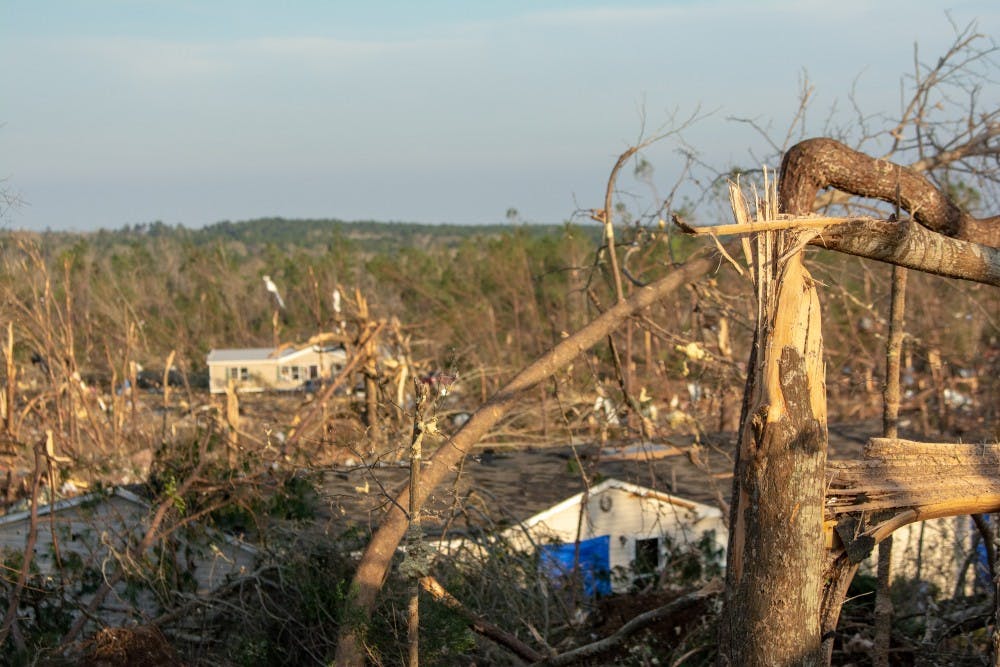
Slater’s family huddled in a bathroom in the center of the mobile home, praying the tornado would dodge them. It didn't.
National Weather Service officials said Tuesday that Beauregard had about eight or nine minutes of warning before the EF4 tornado with 170 MPH winds hit shortly after 2 p.m.
“I said call me when it passes,” Slater said. “You always hear about them hitting, but you never think about it affecting you.”
Minutes later, the tornado — a mile-wide behemoth with the windspeed of a Category 5 hurricane — ripped through their neighborhood, and ripped through it hard. Most of the roof was torn off of Slater’s childhood home. Trees snapped in half and fell down around Slater's family.
Her stepdad’s Coca-Cola delivery truck was knocked on its side, its windows shattered, falling into another vehicle in their yard.
“She called me about four minutes later and said, ‘It got us, baby. It got us,'” Slater said. “That's when she was crying and screaming.”
Unlike several other families who lost their loved ones Sunday, Slater still has a mother, a stepdad, her brother and two sisters. Her family survived the storm.
“Everybody made it out without a scratch,” Slater said.
Their's wasn't a tragic ending, but it will be a difficult road ahead.

Their home, however, didn’t survive.
The roof is gone from the part of the house where they sought shelter in a bathroom.
The National Weather Services recommends huddling in a small, windowless interior room with protection — preferably a helmet, pillows and a comforter — to shield the head and cover the body.
“That middle square, where there’s no roof," Slater said, pointing to what was left of the home. "They were all there in that bathroom huddled together."
Others weren't so lucky. Twenty-three people died Sunday. Four people from the area remain in critical condition at hospitals in Alabama and Georgia, recovering from their injuries.
Staying alert
Lee County Sheriff Jay Jones and Lee County EMA Director Kathrine Carson said Monday that it isn't known if tornado sirens in the area went off, but even if they had, tornado sirens are meant for those outdoors.
"I'm pretty sure they did [go off], but we, in emergency management and the National Weather Service, have begun to move away from these outdoor warning sirens as the primary warning method," Carson said.
All of the dead were believed to be in their homes, though, when the tornado hit, according to the sheriff and Lee County coroner. Many were not found in their homes — if there was anything left other than a slab of concrete.
Nearly all smart phones now send what are known as IPAWS weather emergency alerts, and the EMA and National Weather Service use social media and NOAA weather radios to send out warnings. Weather radios and IPAWS alerts are the most reliable methods of warning — if one doesn't turn them off.
It's impossible to know how many even knew a storm was coming, and, had they known, if they could have survived.
More severe weather is possible Saturday and Sunday, though forecasters say the most significant threat should be north and west of Lee County.
"The highest threat is north of Lee County, praise God," said Chris Darden, meteorologist in-charge at the Birmingham National Weather Service.
At least 30 tornadoes touched down in the Southeast Sunday. Twelve were in Alabama. The EF4 tornado was the most powerful to hit Lee County since 1875 and the most powerful March tornado to hit Alabama since 1932.
The NWS and EMA officials say residents should stay alert this weekend using NOAA weather radios, smart phones or by watching local news. It could save your life.
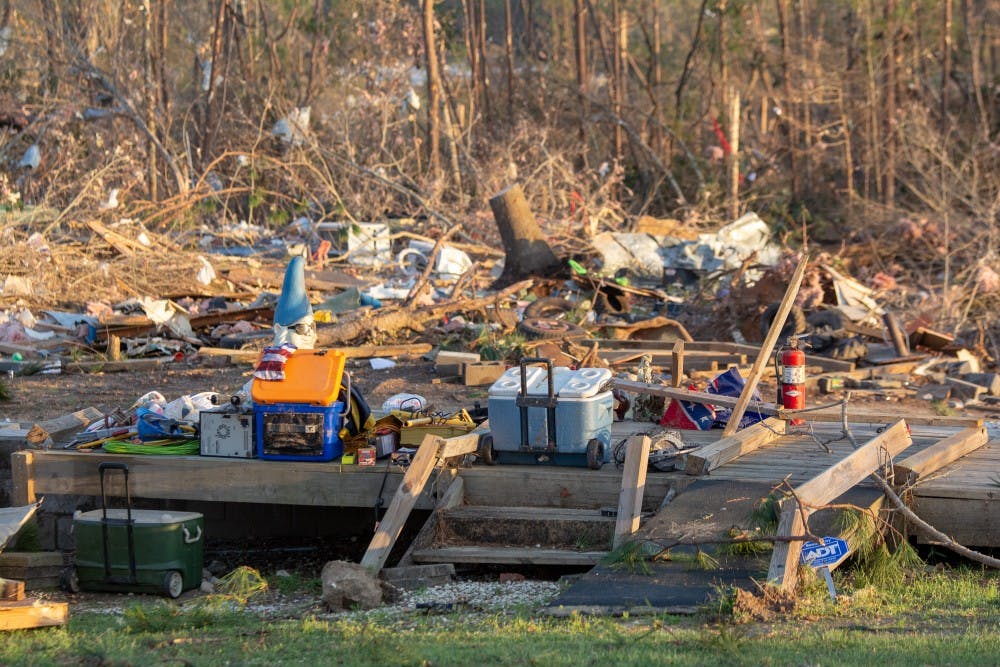
A neighborhood devastated
Slater's family's next-door neighbor is dead.
“His house was gone,” Slater said.
The house across the street was picked up and moved 30 feet from its foundation.
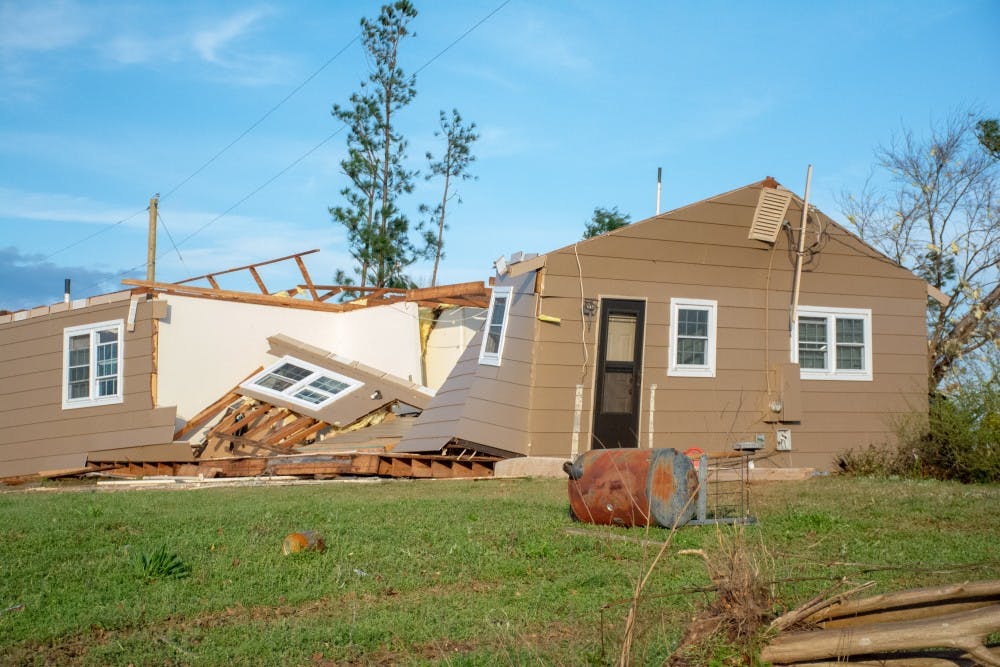
A family on the other side lost their new mobile home.
“Their trailer actually burned down in October, so they went and got a new trailer, and they just set it up about a week before Thanksgiving — and to have this happen,” Slater said.
Slater's mother, stepdad and sibling are staying at her home in Opelika until they can find a new place to live.
FEMA is on the ground now in Beauregard. Along with other community organizations, businesses and nonprofits, FEMA is helping families who lost their homes recover from the storm.
Four FEMA mobile registration centers went online Thursday to help those affected. FEMA assistance helps families with underinsured properties or no insurance at all. Those affected can register online, too, at disasterassistance.gov.
Like a scene from a movie
As soon as her mom called her back after the storm hit, Slater flew down the road. She said she got there in less than 10 minutes.
“The main road was so congested with ambulances and police cars,” Slater said. “I saw a man walking, holding the top of his head with blood coming out. It was like a scene from a movie. It was so scary.”
Less than an hour later, a second tornado warning was issued. An EF2 tornado touched down just miles from where Slater was trying to find her family.
“I didn’t know if it had passed,” Slater said. “I just sat there in the car and prayed. I told them, you know, run. They got in the car with me. I hit my blinkers and went straight to my house.”
Backpacks with homework intact, barbie dolls without a scratch and coffee cups without a chip littered the ground in the community hit hardest by Sunday's storms — a harsh juxtaposition to leveled homes.
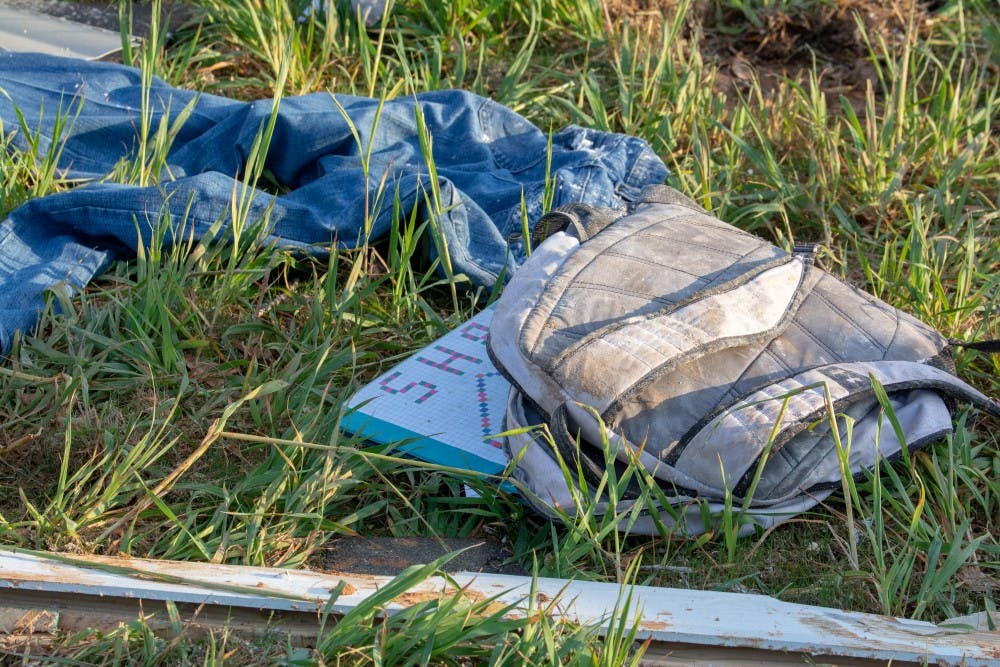
Slater's family belongings were strewn no telling how far. Insulation from the home — and the other homes in the area — littered the ground and the trees.
“They don’t have anything. We’ve just been taking donations — food, clothes, anything — because they don’t have nothing left,” Slater said, taking a minute's break from helping her family clean up. “It's gone.”
In the debris, Slater's husband was able to find her UAB college diploma — one of her proudest achievements.
“He found that for me, but everything else was gone,” Slater said. “But I’m just glad everyone is okay. They are my whole life.”

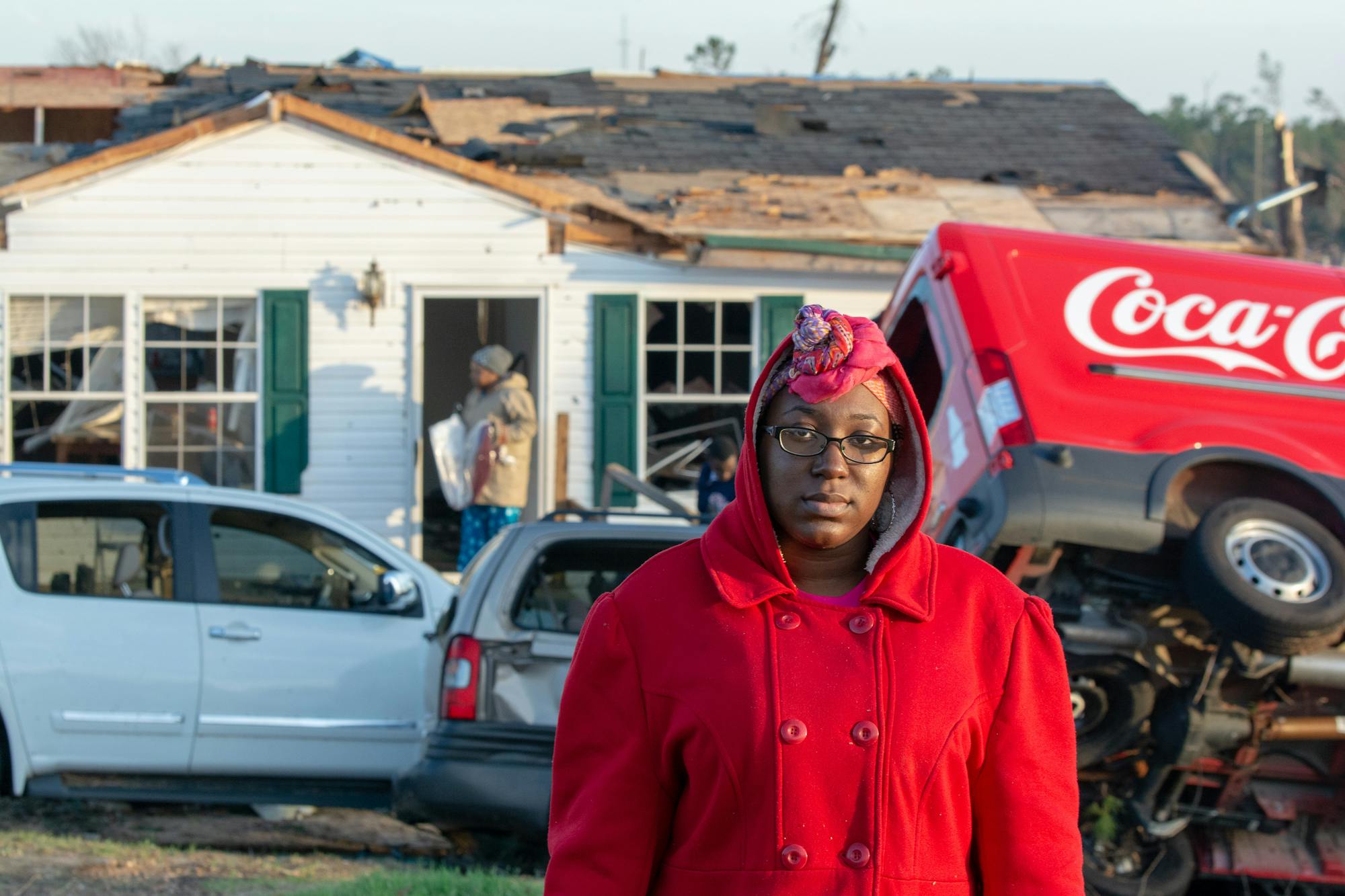

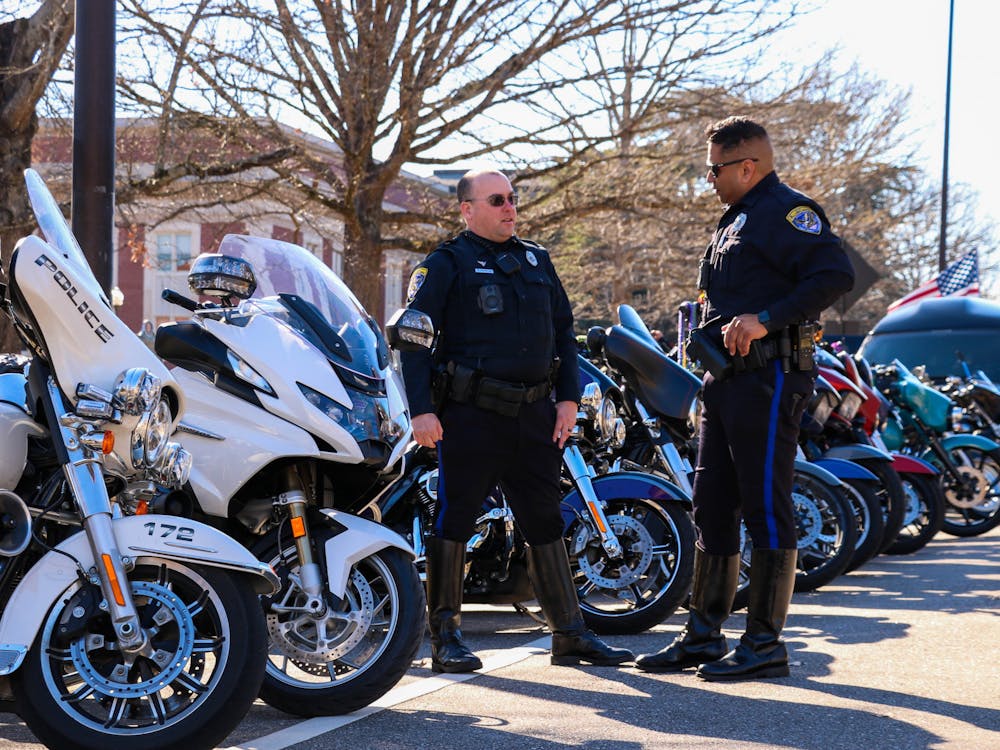

Share and discuss “This woman called her family to warn of an approaching tornado. It might have saved their lives.” on social media.